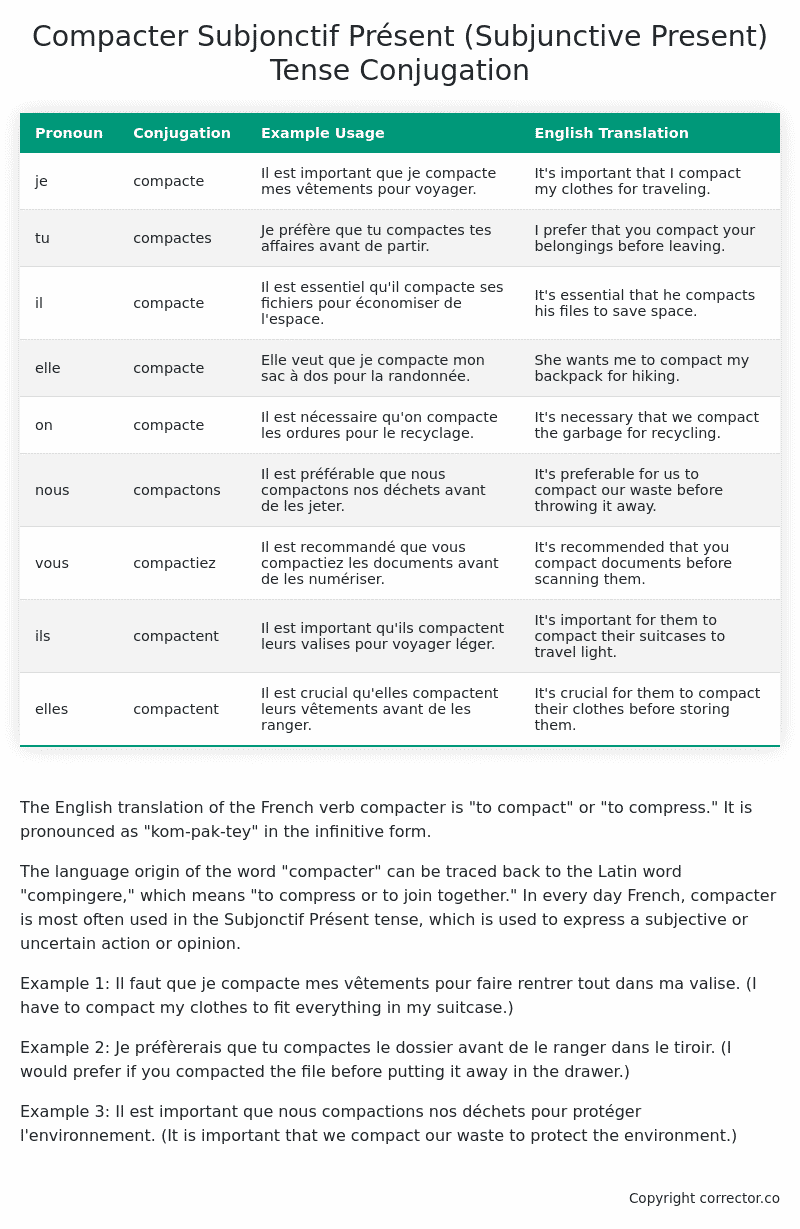Subjonctif Présent (Subjunctive Present) Tense Conjugation of the French Verb compacter
Introduction to the verb compacter
The English translation of the French verb compacter is “to compact” or “to compress.” It is pronounced as “kom-pak-tey” in the infinitive form.
The language origin of the word “compacter” can be traced back to the Latin word “compingere,” which means “to compress or to join together.” In every day French, compacter is most often used in the Subjonctif Présent tense, which is used to express a subjective or uncertain action or opinion.
Example 1: Il faut que je compacte mes vêtements pour faire rentrer tout dans ma valise. (I have to compact my clothes to fit everything in my suitcase.)
Example 2: Je préfèrerais que tu compactes le dossier avant de le ranger dans le tiroir. (I would prefer if you compacted the file before putting it away in the drawer.)
Example 3: Il est important que nous compactions nos déchets pour protéger l’environnement. (It is important that we compact our waste to protect the environment.)
Table of the Subjonctif Présent (Subjunctive Present) Tense Conjugation of compacter
| Pronoun | Conjugation | Example Usage | English Translation |
|---|---|---|---|
| je | compacte | Il est important que je compacte mes vêtements pour voyager. | It’s important that I compact my clothes for traveling. |
| tu | compactes | Je préfère que tu compactes tes affaires avant de partir. | I prefer that you compact your belongings before leaving. |
| il | compacte | Il est essentiel qu’il compacte ses fichiers pour économiser de l’espace. | It’s essential that he compacts his files to save space. |
| elle | compacte | Elle veut que je compacte mon sac à dos pour la randonnée. | She wants me to compact my backpack for hiking. |
| on | compacte | Il est nécessaire qu’on compacte les ordures pour le recyclage. | It’s necessary that we compact the garbage for recycling. |
| nous | compactons | Il est préférable que nous compactons nos déchets avant de les jeter. | It’s preferable for us to compact our waste before throwing it away. |
| vous | compactiez | Il est recommandé que vous compactiez les documents avant de les numériser. | It’s recommended that you compact documents before scanning them. |
| ils | compactent | Il est important qu’ils compactent leurs valises pour voyager léger. | It’s important for them to compact their suitcases to travel light. |
| elles | compactent | Il est crucial qu’elles compactent leurs vêtements avant de les ranger. | It’s crucial for them to compact their clothes before storing them. |
Other Conjugations for Compacter.
Le Present (Present Tense) Conjugation of the French Verb compacter
Imparfait (Imperfect) Tense Conjugation of the French Verb compacter
Passé Simple (Simple Past) Tense Conjugation of the French Verb compacter
Passé Composé (Present Perfect) Tense Conjugation of the French Verb compacter
Futur Simple (Simple Future) Tense Conjugation of the French Verb compacter
Futur Proche (Near Future) Tense Conjugation of the French Verb compacter
Plus-que-parfait (Pluperfect) Tense Conjugation of the French Verb compacter
Passé Antérieur (Past Anterior) Tense Conjugation of the French Verb compacter
Futur Antérieur (Future Anterior) Tense Conjugation of the French Verb compacter
Subjonctif Présent (Subjunctive Present) Tense Conjugation of the French Verb compacter (this article)
Subjonctif Passé (Subjunctive Past) Tense Conjugation of the French Verb compacter
Subjonctif Imparfait (Subjunctive Imperfect) Tense Conjugation of the French Verb compacter
Subjonctif Plus-que-parfait (Subjunctive Pluperfect) Tense Conjugation of the French Verb compacter
Conditionnel Présent (Conditional Present) Tense Conjugation of the French Verb compacter
Conditionnel Passé (Conditional Past) Tense Conjugation of the French Verb compacter
L’impératif Présent (Imperative Present) Tense Conjugation of the French Verb compacter
L’infinitif Présent (Infinitive Present) Tense Conjugation of the French Verb compacter
Struggling with French verbs or the language in general? Why not use our free French Grammar Checker – no registration required!
Get a FREE Download Study Sheet of this Conjugation 🔥
Simply right click the image below, click “save image” and get your free reference for the compacter Subjonctif Présent tense conjugation!

Compacter – About the French Subjonctif Présent (Subjunctive Present) Tense
Formation of the Subjonctif Présent
Common Everyday Usage Patterns
Interactions with Other Tenses
Summary
I hope you enjoyed this article on the verb compacter. Still in a learning mood? Check out another TOTALLY random French verb conjugation!


